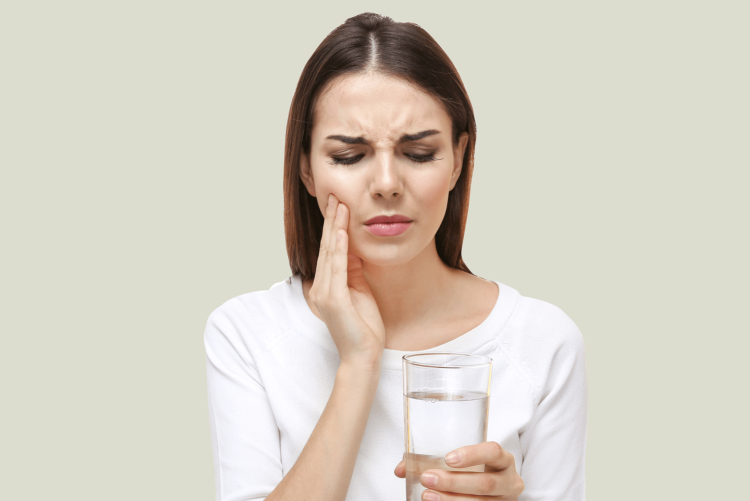Introduction: Understanding Tooth Sensitivity
Tooth sensitivity is a common issue that many people face at some point in their lives. If you’ve ever experienced a sharp, sudden pain when eating or drinking something hot, cold, sweet, or sour, you’re not alone. Known as dentin hypersensitivity, this condition can cause discomfort in your teeth, particularly when the enamel wears down or gums recede, exposing the sensitive inner layers of the teeth.
While tooth sensitivity can be bothersome, the good news is that there are several ways to manage and reduce the discomfort. In this article, we’ll explore the causes of tooth sensitivity, how to identify its symptoms, and most importantly, share simple, effective methods to help alleviate the pain.
1. What Causes Tooth Sensitivity?
Tooth sensitivity occurs when the enamel that protects your teeth becomes thinner, or when your gums begin to recede, exposing the underlying dentin. Dentin is much softer than enamel and contains tiny tubules (canals) that lead to the nerve inside the tooth. When these tubules are exposed, stimuli such as heat, cold, acidity, or sweetness can easily reach the nerves inside, causing pain or discomfort.
Here are some common causes of tooth sensitivity:
1.1 Enamel Erosion
- How It Happens: Over time, your tooth enamel can wear down due to excessive consumption of acidic foods or drinks, brushing your teeth too aggressively, or grinding your teeth. As the enamel wears away, the underlying dentin becomes exposed.
- Impact: The exposed dentin allows hot, cold, sweet, or acidic foods and drinks to reach the nerves inside the tooth, causing sensitivity.
1.2 Gum Recession
- How It Happens: Gum recession occurs when your gums pull back from the teeth, often due to gum disease, aggressive brushing, or aging. This exposes the tooth roots, which are not covered by enamel and are highly sensitive.
- Impact: When the tooth roots are exposed, even slight stimuli, such as brushing, eating, or drinking, can trigger pain or discomfort.
1.3 Tooth Grinding (Bruxism)
- How It Happens: Grinding your teeth, especially during sleep, can wear down the enamel and make your teeth more sensitive. It can also lead to gum recession, further exacerbating the problem.
- Impact: Bruxism places extra pressure on the teeth, increasing the risk of enamel loss and gum damage.
1.4 Dental Procedures
- How It Happens: After a dental treatment such as a filling, crown, or teeth whitening, your teeth may become temporarily sensitive. This is a normal reaction and usually subsides within a few days or weeks.
- Impact: Sensitivity caused by dental procedures is typically short-lived but can be quite uncomfortable in the meantime.
1.5 Tooth Decay or Cavities
- How It Happens: If you have untreated cavities, the bacteria can erode the enamel and reach the sensitive dentin. As the cavity grows, the sensitivity increases.
- Impact: Once the decay reaches deeper layers of the tooth, it can cause constant pain and discomfort, especially when chewing or eating hot or cold foods.
1.6 Acidic Foods and Drinks
- How It Happens: Foods and beverages such as citrus fruits, soda, wine, and coffee can erode enamel over time, leading to sensitivity. These acids can soften the enamel and increase the exposure of dentin.
- Impact: Repeated consumption of acidic foods or drinks can wear down the protective enamel layer, leading to more frequent sensitivity.
2. Symptoms of Tooth Sensitivity
Tooth sensitivity can range from mild discomfort to sharp, intense pain. Here are some common symptoms to watch out for:
- Sharp pain when eating or drinking: If you feel sudden, sharp pain when consuming hot, cold, sweet, or acidic foods and drinks, it’s likely due to tooth sensitivity.
- Pain when brushing or flossing: Brushing or flossing can trigger discomfort, especially near the gumline or when the gums have receded.
- Lingering discomfort: Sensitivity can be temporary, but it may also last for a few minutes after eating or drinking. If the pain persists for longer periods, it may indicate a more severe dental issue.

3. Simple and Effective Ways to Relieve Tooth Sensitivity
The good news is that there are several ways to manage tooth sensitivity, depending on the severity of the condition. Here are some simple methods to relieve discomfort:
3.1 Use a Toothpaste for Sensitive Teeth
- How It Helps: Special toothpaste designed for sensitive teeth contains compounds like potassium nitrate or strontium chloride, which block the tubules in the dentin, preventing stimuli from reaching the nerve.
- Best Practice: Brush your teeth with desensitizing toothpaste at least twice a day. It may take several applications to see noticeable relief, so consistency is key.
3.2 Avoid Acidic Foods and Drinks
- How It Helps: Reducing the consumption of acidic foods and drinks can prevent further enamel erosion and reduce sensitivity. Citric fruits, carbonated beverages, wine, and coffee are known to be particularly harmful.
- Best Practice: If you do consume acidic foods or drinks, rinse your mouth with water afterward to neutralize the acids and protect your enamel.
3.3 Practice Gentle Brushing Techniques
- How It Helps: Brushing your teeth too hard can wear down enamel and irritate your gums, increasing sensitivity. Use a soft-bristled toothbrush and gentle strokes when brushing.
- Best Practice: Brush your teeth for two minutes, twice a day, using fluoride toothpaste and a soft-bristled brush. Avoid using excessive force when brushing.
3.4 Use a Mouthguard for Teeth Grinding
- How It Helps: If you grind your teeth at night (bruxism), wearing a mouthguard can protect your teeth from further damage and reduce sensitivity caused by enamel erosion and gum recession.
- Best Practice: Talk to your dentist about getting a custom mouthguard to wear while you sleep. This will prevent tooth damage and help alleviate discomfort.
3.5 Consider Fluoride Treatments
- How It Helps: Fluoride helps strengthen tooth enamel and can help reduce sensitivity. Your dentist can apply fluoride varnishes to your teeth, or you can use over-the-counter fluoride gels or rinses.
- Best Practice: Ask your dentist if fluoride treatments are right for you, especially if you have significant enamel wear.
3.6 Avoid Over-Brushing or Aggressive Flossing
- How It Helps: Brushing too aggressively or flossing too forcefully can irritate your gums and contribute to gum recession. Receding gums are a leading cause of tooth sensitivity.
- Best Practice: Use a gentle touch when brushing and flossing, and avoid scrubbing your teeth or gums too hard.
3.7 Desensitizing Dental Procedures
- How It Helps: In cases of severe tooth sensitivity, your dentist may apply desensitizing agents or use treatments like dental bonding to cover exposed dentin. These treatments help protect the nerves inside your teeth and reduce pain.
- Best Practice: Visit your dentist for professional treatment if over-the-counter products are not providing enough relief.
4. When Should You See a Dentist?
If your tooth sensitivity is severe, persistent, or accompanied by other symptoms like swollen gums, bleeding, or pain while chewing, it’s essential to consult with a dentist. Tooth sensitivity may indicate an underlying dental issue such as cavities, gum disease, or a cracked tooth that requires professional treatment.
A dentist can help diagnose the cause of your sensitivity and recommend appropriate treatments to address it. In some cases, a dental procedure such as a filling, root canal, or gum graft may be necessary to resolve the problem.
5. Conclusion: Managing Tooth Sensitivity for Long-Term Relief
Tooth sensitivity can be a frustrating and painful experience, but understanding the causes and symptoms can help you manage the discomfort effectively. By adopting good oral hygiene habits, using desensitizing products, and avoiding certain triggers like acidic foods, you can significantly reduce sensitivity and protect your teeth.
If your sensitivity is persistent or worsens over time, don’t hesitate to seek professional help. Early intervention can help prevent more serious dental issues and ensure that your teeth remain healthy and pain-free.
By taking proactive steps to care for your teeth and gums, you can enjoy a more comfortable and confident smile, free from the discomfort of tooth sensitivity.













































Discussion about this post